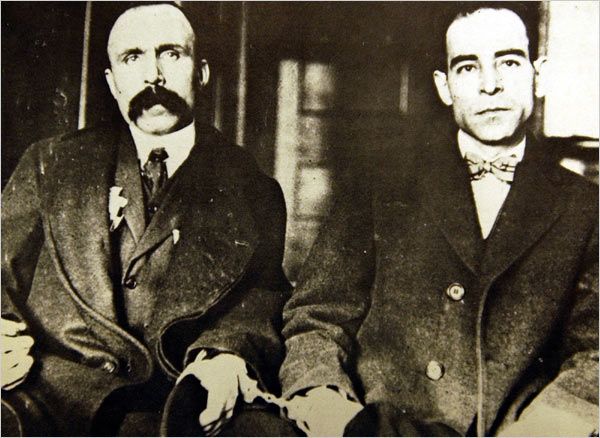The Biggest Trial of the 1920s Continues to Resonate
Sacco and Vanzetti were on trial for their Italianness and their political leanings as much as for their alleged crimes
/https://tf-cmsv2-smithsonianmag-media.s3.amazonaws.com/filer/7a/17/7a17f513-17b0-4bff-a9d4-302deae9b9b3/save_sacco_and_vanzetti.jpg)
People have been asking if Nicola Sacco and Bartolomeo Vanzetti were guilty of the crime for which they were executed for almost a hundred years.
The two Italian-American men were each charged two counts of murder relating to an armed robbery in Massachusetts, in which $15,000 was stolen–they both pled not guilty. Their trial was the event of the decade, according to many sources–it had political intrigue, anti-Italian racism, and drama inside and outside the courtroom over whether these two men had been unfairly accused. On this day in 1921, both were convicted of the crime and sentenced to death–though the evidence against them was “mostly circumstantial,” in the words of historian Moshik Temkin, and their trial was laden with racism and anti-anarchist sentiment. Years of appeals would follow before their eventual executions, which prompted riots in Paris and London and left many still asking: Did they do it?
Both men were involved with a direct-action anarchist movement, the same group that was later blamed for the 1920 Wall Street bombing while they were in jail. But there was little to say they had carried out the armed robbery, writes Temkin, who does not believe it is likely that the pair were guilty. What is certain is that the two defendants certainly looked guilty in the court room, he writes. Both men had been in America for over a decade, Temkin writes, but they had limited English. Their foreignness–at a time when anti-Italian racism was at a high–and their political leanings were used against them:
During their trial, Sacco and Vanzetti were seated in a barred metal cage in the center of the court, a constant reminder of the supposed menace they presented to respectable American society. The evidence against the two men… was mostly circumstantial, save for the prosecutor’s disputed attempt to tie Sacco’s cap to the scene of the crime and his revolver to the shooting. The prosecution could not even show that the two men possessed any of the money from the robbery.
On the other side, writes History.com, “millions of dollars were raised for their defense by the radical left around the world.” Their defense brought more than 100 witnesses to the stand. In the end, though, they were declared guilty.
“When the verdict was returned both men were calm but pale,” The New York Times wrote on that day. “A moment later Sacco, in an outburst, levelled his finger at the jury and cried: ‘You kill two innocent men,” repeating this again and again in English and Italian. ‘We are innocent,’ he said. Vanzetti was silent.”

For journalists at the time, the courtroom drama was unmissable, and the public was hungry to hear more. But even those journalists found themselves questioning the pair’s guilt or innocence. Muckraking journalist Upton Sinclair, who wrote a “documentary novel” about the trial, believed firmly in the pair’s innocence at the beginning, but by the end, was convinced of their guilt, according to NPR. Still, Sinclair felt like many later Americans, writes NPR: whether they were guilty or innocent, the pair never got a fair trial.
Their case has been revisited by the courts a number of times since the pair were executed in 1927 and no conclusive answer about their guilt or innocence has been reached. And the pair have lived on in popular culture. In the years since their deaths, movies and novels about their case have been created, as well as numerous nonfiction books. “Some writers have claimed that Sacco was guilty but that Vanzetti was innocent,” writes Encyclopedia Britannica. “Many historians believe, however, that the two men should have been granted a second trial in view of their trial’s significant defects.” These questions led Massachusetts governor Michael Dukakis to issue a proclamation declaring that the pair “had not been treated justly and that no stigma should be associated with their names,” writes the encyclopedia.